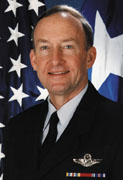I always wondered why a fighting gobbler was used to depict Hokie fearlessness. A turkey is a turkey, at least so I thought. Its image as a fighter was something I accepted on blind faith. But now I have seen the turkey hen fight with a passion that would make the eagle seem tame.
I was starting the grill at my farm and weekend retreat in Dinwiddie, Va., when I saw a turkey coming into the back field. She had about 10 babies about the size of large quail walking with her. I watched with great pleasure the beginning of a new cycle of wildlife.
Without warning, the hen took off vertically as if she had stepped on a mine. About 20 feet off the ground, she intercepted and attacked a hawk that was coming in for a baby. The hen hit the hawk with its feet first and with its back almost parallel to the ground.
The hawk flew toward the back of the field with the hen in pursuit; it turned back towards the babies, and the hen hit it again. They both fell about 10 feet and were fighting with their feet, until the hawk headed for the tree line and kept going.
The hen returned to her babies. When they went back into the pines, the babies were very close to their mother's feet. It was unbelievable. A mid-air fight between a hawk and a turkey. From now on I'll be even more proud of our turkey mascot. Wish you could have seen it.
Everette M. Prosise '68
Back to Contents
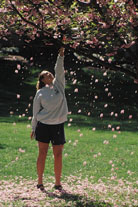
The summer '99 issue incorrectly identified the tree in the cover photo as a dogwood by the Duck Pond. Our readers pointed out the error with unflappable Hokie humor:
Frank P. Nelson '46 wrote: "If there was a seismic event locally on the date of publication of your summer issue, I suggest it was Arthur Ballard Massey tumbling in his grave regarding the lovely young thing on the cover 'enjoying the breeze under a dogwood tree'..." [Note: Massey was a plant pathologist and professor of biology at Virginia Tech from 1918-1959. His annotated collection of photographs of Virginia Tech campus trees is in Newman Library's special collections.]
Audrey S. Robinson wrote: "In a subsequent issue, please have someone describe the kind of dogwood featured. The blossoms are so fluffy!"
Fair enough. The tree, which stands beside the Drillfield pylons, is actually a Japanese flowering cherry or Prunus serrulata "Kwansan." Thanks to Thomas Wieboldt, associate curator for the Massey Herbarium in the biology department, and Alex Niemiera, associate professor and woody plant specialist in the horticulture department, for their help in identifying the tree. Back to Contents
Maj. Gen. Jerrold P. Allen has been named Virginia Tech's new commandant of cadets. Allen is a retired Air Force major general whose last assignment was vice commander of the 21st Air Force Headquarters at McGuire Air Force Base in New Jersey. Prior to accepting the position of commandant, Allen headed operations for the U.S. Nursing Corp. in Denver.
Allen holds an M.B.A. in management from Golden Gate University and a bachelor's degree in engineering management from the U.S. Air Force Academy. Among his military awards and decorations are the Defense Superior Service Medal, Legion of Merit award, Meritorious Service Medal, Air Medal, and Air Force Commendation Medal, all with one or more oak-leaf clusters, and the Distinguished Flying Cross.
Allen succeeds Maj. Gen. Stanton R. Musser, who retired at the end of the 1998-99 academic year. Back to Contents
To help speed the next generation of Internet products, services, and applications, Virginia Tech and the Center for Innovative Technology (CIT) have opened Virginia's first Internet2 technology studio. With potential applications for higher learning--such as online collaborative research, distance learning, and video-conferencing--the Internet2 project has attracted the involvement of 154 U.S. colleges and universities.
The key to Internet2 technology is wider bandwidth, which allows a greater amount of data per second to be transmitted through a computer's communication ports. The studio's equipment can transmit data at more than 10 million bits per second; by comparison, a standard modem transmits 56,000 bits per second. The speed of the Internet2 allows users to see broadcast-quality video over the Internet, for example.
The CIT pays rent on the studio and Tech staffs it. Tech worked with its corporate partners--including Litton Network Access System of Roanoke, Dell Computers, Bell Atlantic Virginia, Sprint, A&J Technologies, Amteva, CRT, EduTest, EMR, CISCO Systems, FORE, Leibert, and Zydacron--to provide the studio's equipment.
Located at 11 South 12th Street in Richmond, Va., the studio is open free of charge from 10 a.m. to 2 p.m. Monday through Friday. Back to Contents
Cut in youth smoking predicted
The decision by manufacturers to raise the price of cigarettes last year will likely mean fewer young people will take up smoking and fewer farmers will grow tobacco in the future, according to a study by Virginia Tech agricultural economist Wayne D. Purcell.
Cigarette manufacturers raised the price of a pack of cigarettes last November by 45 cents, to an average per-pack price of $2.40. That price increase, which will finance the settlement of $206 billion reached between the industry and state attorneys general last year, could eventually result in a 9-percent reduction in overall domestic cigarette consumption, according to the study. The study also suggests that the price increase will eventually result in a 26-percent consumption decline among young people. Back to Contents
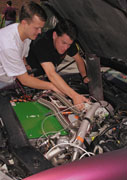
Tech wins second in FutureCar challenge
Will the cars of the future run on electricity, producing only pure water as exhaust? As part of the 1999 FutureCar Challenge, a team of Virginia Tech engineering students adapted a Chevrolet Lumina to do just that. Tech placed second among 13 U.S. universities.
The challenge requires students to modify a car to make it more fuel-efficient and environmentally friendly without sacrificing safety, reliability, or convenience. Sponsors provided each team with a family-sized sedan and $10,000 start-up money; the electric fuel cells Tech used cost $250,000 and were funded by the U.S. Department of Defense.
The Tech hybrid-electric-vehicle team--comprised of 30 seniors in
mechanical and electrical engineering, a graduate student in mechanical engineering, and about 20 volunteers from other courses of study--used fuel cells to convert hydrogen and oxygen into electricity, which powered the car.
In the four years of the annual FutureCar Challenge, Tech has won the trophy once, tied for first once, and always finished second or higher. Back to Contents 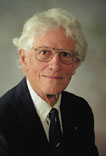
John Cairns Jr., University Distinguished Professor of Environmental Biology Emeritus at Virginia Tech, has been elected to membership in the American Philosophical Society, founded in 1743 by Benjamin Franklin and devoted to the advancement of scientific and scholarly inquiry. Cairns' research aims at improving the quality of information used in making environmental decisions.
Early members of the society included George Washington, John Adams, Thomas Jefferson, Thomas Paine, James Madison, and John Marshall. In the 19th century, those elected included John James Audubon, Robert Fulton, Charles Darwin, Thomas Edison, and Louis Pasteur. Members in the 20th century included Albert Einstein, Robert Frost, and George Marshall.
Today the society has 832 elected members, 690 from the United States and 142 from more than two dozen foreign countries. Since 1900 more than 200 of the society's members have received the Nobel Peace Prize. Back to Contents
Tech adopts American history requirement
High-school students who plan to come to Virginia Tech better start cracking the history books. The Virginia Tech Board of Visitors has adopted a requirement that all Virginia Tech graduates have a "significant knowledge of American history." The requirement begins for students entering in fall of 2001.
"Critical concepts of American history are necessary for responsible citizenship and participation in a democratic society," said Heywood Fralin, chair of the board's subcommittee on academic affairs.
Students can demonstrate the expected knowledge of American history upon enrollment at Tech in a variety of ways, including passing the advanced placement history exam or achieving a high score on the Virginia Standards of Learning achievement test (or another state's equivalent test). Otherwise, students must complete courses that are deemed to satisfy the requirement for U.S. history. Back to Contents 
The American Association of University Women (AAUW) Educational Foundation has chosen Martha McCaughey to receive the 1999 Recognition Award for Emerging Scholars. The award recognizes the early professional achievement of a non-tenured woman scholar who has a record of exceptional early accomplishments and who shows promise of future distinction.
McCaughey is part of the faculty in women's studies at Virginia Tech; she is also an adjunct professor in sociology and in science and technology studies. Her book, Real Knockouts: The Physical Feminism of Women's Self Defense, has changed thinking about gender, the body, and self defense. She wrote the book after discovering a subculture of women training in self-defense to thwart attacks. Back to Contents
Foy recognized for international work
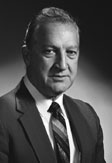 Chester L. Foy, a Virginia Tech plant physiologist and weed scientist, has received the Gamma Sigma Delta International Award for Distinguished Achievement in Agriculture. Gamma Sigma Delta is the honor society of agriculture.
Chester L. Foy, a Virginia Tech plant physiologist and weed scientist, has received the Gamma Sigma Delta International Award for Distinguished Achievement in Agriculture. Gamma Sigma Delta is the honor society of agriculture.
Foy joined the Tech faculty in 1966. He is an international authority on the physiology and biochemistry of the mechanisms of action of herbicides and adjuvants, the materials that are combined with herbicides to improve mixing and application or to enhance performance. He has had leading roles in international projects to eliminate crop devastation due to parasitic weeds and in an integrated pest management project administered through Virginia Tech's Office of International Research and Development. Back to Contents
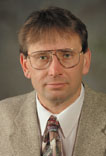
Tech lures pharmaceutical company
Pharming Healthcare Inc., the American subsidiary of Pharming Group N.V. of Leiden, Netherlands, will locate a transgenic cattle farm in Craig County, Va., and a purification facility at the Virginia Tech Corporate Research Center. Pharming, the world's largest producer of transgenically produced pharmaceuticals, plans to invest about $37 million in Virginia to produce Human Factor VIII and Fibrinogen in the milk of transgenic animals; these therapeutic blood-clotting proteins are used to treat patients with hemophilia and to help control bleeding in surgery and trauma.
Pharming's production techniques are partially based on technologies developed at Tech. Beginning with the groundbreaking work of William Velander, professor of chemical engineering and director of the university's Pharmaceutical Engineering Institute, the university has progressively increased the ability of the world's scientific community to commercialize transgenic discoveries. Velander holds several patents on the development of therapeutic proteins. Back to Contents
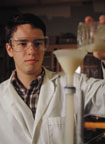
Tech researchers earn 27 patents
A new, low-cost material for purifying proteins has sprung from the research of wood science Ph.D. candidate Jason Todd. The material, made from a structural component in crab and shrimp shells called chitosan, can be used to isolate antibodies from blood serum or cell cultures in order to diagnose and treat diseases. Todd received a patent for the material--one of 27 patents granted to Virginia Tech researchers in 1998--with professor of wood science Wolfgang Glasser and Swapan Roy of LigoChem Inc.
Another patent went to entomology professor Richard Fell and Colleen Cannon (entomology M.S. '90, Ph.D.), who developed an environmentally safe bait to control carpenter ants. The bait, which is highly attractive to the ants, is licensed to a multi-national company and will soon appear on store shelves.
The university also obtained patents for three new raspberry plants, a method for preparing derivatives of the anti- cancer drug Taxol, a non-toxic mercury substitute, an electrically activated foam for noise and vibration control, and a 3-D microscopy system. Back to Contents
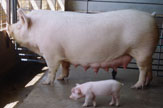
A type of swine pneumonia that causes millions of dollars in production losses each year can now be prevented by a vaccine developed by Thomas Inzana of the Virginia-Maryland Regional College of Veterinary Medicine. The U.S. Departmentof Agriculture has approved the genetically altered vaccine, named Actinobacillus pleuropneumoniae Attenuate Live Culture.
The vaccine is avirulent, meaning that it causes minimal side effects. To achieve avirulence, Inzana mutated part of the DNA of the bacterium used to create the vaccine. It is the first avirulent live vaccine ever approved for preventing bacterial respiratory disease in animals. Inzana believes the technique he used to create the vaccine can also be used in vaccines to prevent "shipping fever" in cattle. Back to Contents
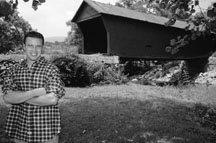
Appal Corps spruces up historical bridge
Perry Martin (communication '97) and student volunteers from Virginia Tech's Appal Corps program are working to repair the Clover Hollow bridge in Giles Co., Va., and to beautify the area around this historical landmark, one of eight covered bridges left in Virginia. Last spring, the students cleared trees around the bridge and sold gift bricks to replace the asphalt leading to it.
Appal Corps grew out of a community service partnership Martin founded in 1997 between Tech's Appalachian studies and service-learning programs and the town of Newport, Va. Martin has led nearly 200 Tech students in Appal Corps projects, including building a village green in Newport and brightening the flower beds of a senior citizens' center in Pearisburg, Va. The group also assists individuals: they visit the elderly, for example, and built a birdfeeder for a housebound woman.
Martin, who was featured as one of 15 volunteers nationwide in the publication for the 1997 Summit on America's Future, hopes to get other colleges and universities in Appalachian areas involved in Appal Corps. Back to Contents
Home | News | Features | Philanthropy | Athletics | Alumni | Classnotes | Editor's Page

